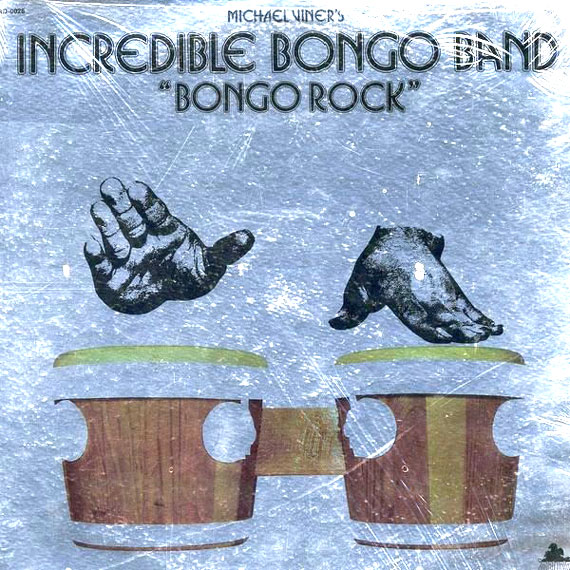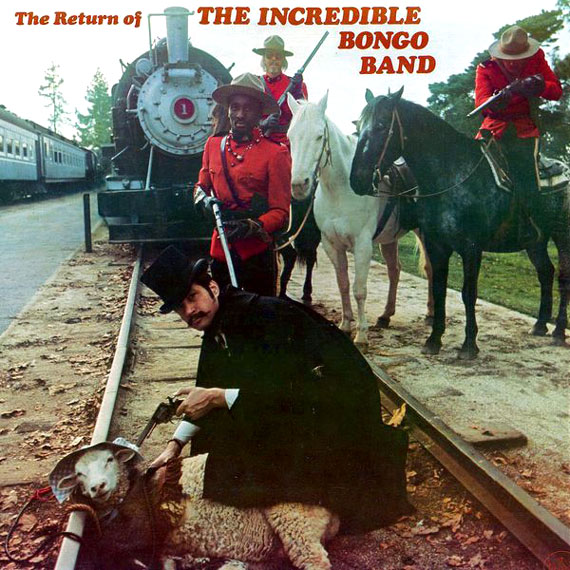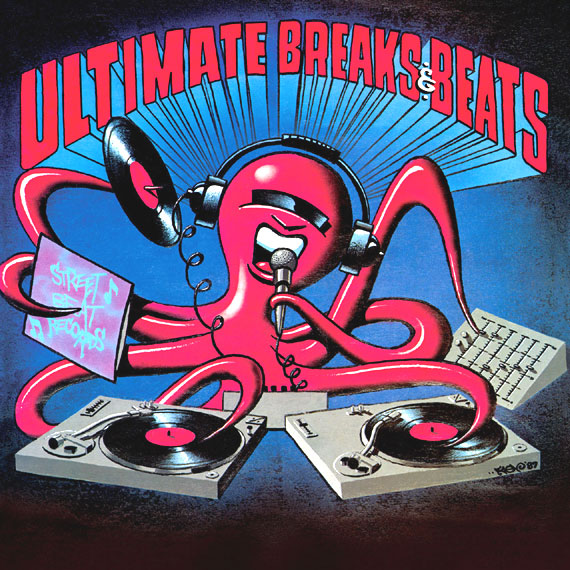“Apache” or the “Apache Break” by The Incredible Bongo Band is one of the most important records in Hip Hop culture. Apache was one of the earliest records to be sampled by pioneers of Hip Hop music even before sampling technology allowed it and has been sampled frequently ever since.
In part 3 of the Classic breaks series break to the beat are going to take an in depth look at the circumstances that lead to the creation of one of the phattest floor shaking compositions ever to be created.
Apache was one of the early records that shaped the way Hip Hop music made the transition from a live art form to recorded pieces of music. Apache was one of the records that made the B-Boys at the early block party’s get up and throw down their moves, it was a record that early Hip Hop and dance musicians would experiment with and turn in to several of what is today known as classic Hip Hop and dance music. Apache is an essential piece of vinyl for any DJ to own and was first popularised in the 1970’s by pioneering Hip Hop DJs such as Kool Herc, Grandmaster Flash, and Africa Bambaataa.
For any readers that are unfamiliar with The Incredible Bongo Band’s version of Apache please check the below clip:
Michael Viner’s Incredible Bongo Band “Apache” 1973 Pride Records
The Incredible Bongo Band was started as a project in 1972 by Michael Viner who was working as a record artist manager and executive at MGM Records. Michael Viner was asked to provide the soundtrack for a film written by Wes Bishop and directed by Lee Frost entitled “The thing with two heads“. The plot of the film was based around a dying wealthy white racist whose head ends up being transplanted on to a black death row inmate’s body allowing the survival of both parties in a mutually beneficial arrangement. The thing with two heads film trailer can be seen in the below clip:
The Thing With Two Heads Trailer (Directed by Lee Frost) 1972
Michael Viner put the soundtrack together by using studio down time at MGM (This was blocks of time where the recording studio was available because it was not being used by MGM recording artists or management). It is rumoured that some of the musicians that contributed to the recording sessions included drummer James Beck “Jim” Gordon who played with bands Derek and the Dominoes, and Little Richard. Ringo Starr from the legendary rock and roll band The Beatles. Bongo player King Errisson who has played and toured with Motown legends The Jackson 5, Dianna Ross and soul legend Marvin Gaye. The downtime sessions resulted in several recordings that Michael Viner and Perry Botkin Jr produced and arranged. Many of the recordings were cover versions of popular songs of the time one of which was Apache. In 1973 the first album entitled “Bongo rock” was released.
The Incredible Bongo Band “Bongo Rock” 1973 Pride Records
The original version of Apache was composed by English song writer Jerry Lorden and first recorded by guitarist Bert Weedon in 1960.
Burt Weedon “Apache” Top Rank International 1960
Jerry Lorden did not like the Bert Weedon original and in 1960 a second recording was made by British pop group The Shadows. The Shadows version reached number 1 in August 1960 where the song remained for 5 weeks.
Below is the Shadows recording of Apache:
The Shadows “Apache” 1960 Columbia Records
The Incredible Bongo Band was never actually a band. It was a recording project. A fake band was assembled and photographed for publicity and media use after the success of the first album. Some of these images were allegedly used on the projects second release in 1974 entitled “The Return of the Incredible Bongo Band”.
The Incredible Bongo Band 1974 Pride Records
The Incredible Bongo Band’s version of Apache was relatively obscure until the explosion of the Hip Hop culture in New York in the mid-late 1970’s where thanks to the Hip Hop DJ’s the record gained a new popularity.
Hip Hop first appeared on wax in 1979. Although it is debatable which record was released first The Sugar Hill Gang’s Rappers delight had the most impact and exposed some elements of the Hip Hop culture to a global audience. Rappers delight was constructed around the instrumental section also identified as the “break” of a record called Good times by Chic. Before Hip Hop music made it to vinyl it was only either heard live at a block party or performance or via a cassette tape of the live block party or performance. These cassette tapes were what helped to spread the culture from the Bronx to the other boroughs of New York City and beyond.
Cassette Recording of a block party from 1977 with DJ Stevie Steve, Lil Rodney Cee & Lil Shotgun
Naturally records with longer breakdowns sections gave MC,s more time to perform raps. These percussion breakdowns were also the point where the B-Boys would be most hyped. DJ Kool Herc is credited as the first DJ to switch between the different breakdown sections of records like James Brown’s Give it up or turn it loose and The Incredible Bongo Band’s Bongo rock which he demonstrates in the below footage:
DJ Kool Herc taken from the documentary “The Hip Hop Years”
Grandmaster Flash later developed what he called the quick mix theory where he was able to loop a 5-10 second drum break continuously using 2 turntables and a mixer. Grandmaster Flash demonstrates his technique in the below footage from 1983:
Grandmaster Flash – How to do a break mix
Good times by Chic was not necessarily a block party anthem. It was however a popular Disco record with a long breakdown section in the middle of the track and required very little DJ skill to loop the break beat as there is more than ample time to cue up the break on the second turntable. Apache by The Incredible Bongo Band has the same characteristics and an equally long breakdown section but has a much harder rhythm and at the time would have been a lot more of an obscure record to find.
Chic “Good times” 1979 Atlantic Records
The story behind “Rappers delight” by The Sugar Hill Gang is a controversial one. At the time of its release in late 1979 Hip hop crews like The Cold Crush Brothers and The Furious Five were already ghetto superstars and were paving the way for Hip Hop music in a live form. The 3 rappers from The Sugar Hill Gang however were picked and placed together by Sugar Hill Records label owner Sylvia Robinson for the purpose of recording a rap record. Rappers delight however was a commercial success and became a worldwide phenomenon opening the door for other more established crews to break through in to the music industry. To add to the controversy of Rappers delight was Big Bank Hank’s reuse or copying of lyrics one of raps godfathers Grandmaster Caz who was never credited for his work. Because of these issues the record at the time was seen as a watered down version of Hip Hop by some of those involved in the New York sub culture.
Below is the full version of Rappers Delight:
The Sugar Hill Gang “Rappers Delight” 1979 Sugar Hill Records
What is most relevant to this article is the way that Rappers delight was constructed. The difference between Hip Hop music in its original live form as opposed to any other forms of music is that it is created and built around grooves of other records with instrumental breakdown sections, also known as breaks or break beats. Rappers delight was constructed around the instrumental breakdown section of Good times by Chic. Sugar Hill Records employed session musicians to replay the break beats and instrumental groves of existing records so the rappers could record their rhymes. Weather replaying the break beat live of sampling a break beat digitally it is a characteristic that defines Hip Hop and sets it apart from other forms of popular music.
In 1981 The Sugar Hill Gang used the same techniques to create a follow up single entitled Apache (Jump on it). This was the first time the Apache break had been incorporated in a Hip Hop record.
The Sugar Hill Gang‘s version can be heard in the below clip:
Sugar Hill Gang “Apache (Jump on it)” 1981 Sugar Hill Records
The same year the Apache break beat also made an appearance on another Sugar Hill Records release. This time however it was in it’s original form and part of a record called The adventures of Grandmaster Flash on the wheels of steel which was a live turntable mix of multiple records by DJ Grandmaster Flash. The adventures of Grandmaster Flash on the wheels of steel was recorded using 3 turntables (A turntables are also referred to as “Wheels of steel” in Hip Hop culture.
The difference between The adventures of Grandmaster Flash on the wheels of steel as opposed to Apache (jump on it) by The Sugar Hill Gang is that the break beat was not replayed by a live band and kept the authentic sound of The Incredible Bongo Band‘s recording giving it a more rugged sound that is what defines hardcore Hip Hop. Although Apache was not a prominent feature in The adventures of Grandmaster Flash on the wheels of steel the recording techniques used in creating the record were different to anything that had previously been released on the label. It was also the first time many people outside of New York had heard the sound of scratching or a DJ mixing records in this way.
Below is the full length version of The adventures of Grandmaster Flash on the wheels of steel:
Grandmaster Flash “The adventures of Grandmaster Flash on the wheels of steel” 1981 Sugar Hill Records
Hip Hop’s exposure’s continued and the culture started to spread throughout the USA and parts of Europe thanks to the pioneering labels that signed and released Hip Hop artists. In 1983 it was again Sugar Hill Records that released West Street Mob‘s Breakdance electric boogie which was an entire DJ mix that just used different sections of The Incredible Bongo Band’s version of Apache with a few extra electro style vocals and basic scratch techniques. It is likely that West Street Mob recorded Breakdance electric boogie using turntables and a multi track tape recorder as sampling technology had not yet advanced enough to loop entire sections of records in the way Apache was used in their composition. The influence of The Incredible Bongo Band‘s Apache can be heard throughout West Street Mob‘s Breakdance electric boogie and it would be fair to say that its creation would not have been possible without the The Incredible Bongo Band’s version of Apache.
Below is the full length version of West Street Mob‘s Breakdance electric boogie:
West Street Mob “Breakdance Electric Boogie” 1983 Sugar Hill Records
In the early 1980’s as the records popularity grew several bootleg versions of Apache were released. In the 1970’s when Hip Hop started it was part of the culture for DJs to keep their records secret by blanking out or removing the labels and replacing them with different names. Battling has always been a prominent part of the Hip Hop experience and for a DJ having unique break beats would have been an advantage when performing. In 1980 Louis Flores aka Break beat Lou and Lenny Roberts aka Break beat Lenny released a series of bootleg records called Octopus break beats. The Octopus break beat’s were a series of compilation records that contained the original tracks that contained the break beats popularised by the DJs from the Bronx at the block party’s. The releases were a chance for aspiring DJs to obtain in most cases 2 copies of these obscure break beats which again was rumoured to have caused a slight backlash within the DJ community but would definitely help the eventual globalisation of Hip Hop.
Octopus Break Beats (Bootleg compilation)
The below quote is taken from an interview with Break beat Lou at djrobswift.com:
“In the beginning of the 80′s Hip-Hop really started becoming very corporate, only speaking for myself I wanted to preserve the fading elements of which were the DJ and the organic part of the music, The Breakbeat!”
The Octopus break beats series later got re-released officially on Street Beat Records under the more widely recognised name of Ultimate Breaks & Beats which is generally accepted as the bible of classic breaks by DJs worldwide.
Ultimate Breaks & Beats 513 Street Beat Records 1987
In the late 1970’s and early 1980’s Paul Winley of Paul Winley Records was also releasing a similar series of bootlegs called “Super Disco Breaks”. Volume 3 of this series also contained The Incredible Bongo Band’s version of Apache but under the fake name of Arawak All Stars. Paul Winley Records also released several early Hip Hop records including early tracks by Africa Bambaataa.
Super Disco Breaks Vol 3 Paul Winley Records 1980
The reissuing of the block party break beats of which Apache was one of the most popular meant that the next generation of DJs from NYC could easily obtain 2 copies. By the start of the 1980’s Hip Hop music had also made the transition from street entertainment to recorded music which would further widen its appeal and lead to Hip Hop culture spreading across the world. The Familiar sound of the Apache break has maintained a constant presence in popular music since it was first popularised in the 1970’s by the pioneers of Hip Hop. Different generations will have heard its influence in a variety of music but the signature sound will always come back to the same recording by The Incredible Bongo Band.
End of part 1…
In part 2 of the article Break to the beat are going to investigate the Influence that Apache had on producers and recording artists making music with digital samplers.
Read part two of the article: Apache Part Two





